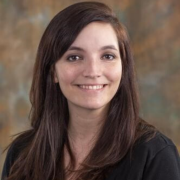You are here
TSSW Awards Excellence in Field Mentorship
Field work is a vital part of social work education, and field instructors at agencies, organizations, hospitals, and partners facilitate that. As Master of Social Work (MSW) students join them in serving their clients and patients, field instructors provide a plan to acclimate students to what they could be doing on a daily basis once they graduate. They focus on each student’s learning needs and supply appropriate experiences for them to gain knowledge and familiarity with social work practices. They also provide guidance and feedback to help them progress and discover how they want to translate what they learn into doing what matters to them beyond their education.
Because of the importance of field instructor collaboration with social work education, the Office of Field Education at Tulane University School of Social Work yearly gives an Excellence in Field Mentorship award. This year’s recipient is Cara B. Donaldson, LCSW-BACS, the Manager of Care Coordination and a licensed social worker at East Jefferson General Hospital.
Cara started her journey of helping people in psychology and psychiatry when her undergraduate advisor at Mississippi State University advised her to take social work classes. “After those classes, I immediately changed to being a social work major,” she says.
Cara supervises two MSW interns who have an interest in medical social work, helps them gain experience in the field, and completes their practicum requirements for graduation and licensure.
Medical social workers support patients in hospitals or other medical settings like nursing homes, rehabilitative care centers, hospice, or home-care services. The list of what medical social workers do for patients and their families is a long one. They provide discharge planning, case management, psychosocial assessments, grief counseling, and referrals. They connect people to information and resources on benefits, terminal illnesses, disabilities, end-of-life decisions, long-term directives, medication management, and independent living.
“It’s a fast-paced, 24-hour-a-day, seven-day-a-week agency,” says Cara. “Those we serve are undergoing rapid life changes, and they need us for education and support. We try to bring down the wall around the healthcare system.”
Medical systems and health are part of a person’s environment. “Health impacts people,” says Cara. “The healthcare system is part of everyone’s life, and it’s not an easy one to understand. How do we navigate around to get people what they need?”
Cara exposes her interns to everything she can. While patients are not in a hospital social workers’ care for long periods of time, many other places where social work is performed come into play. “Your resource book becomes so big with so many connections,” says Cara. “In medical social work, that book becomes alive,” she says. “Our interns learn the system hands-on to gain a foundation of what exists so that they can lead clients to what’s best.”
Interns shadow licensed social workers in each of the different areas, which includes six specialised in acute care and four in post-acute. With infants and children, they may learn how to facilitate an adoption or make a report of abuse or neglect to the Department of Children and Family Services. In the geropsychiatric ward, they may counsel families, suport integrated treatment plans, or participate in discharge planning.
For the first semester and a half, the interns get exposure to all the areas. Then, Cara has them specify their interest. “I ask them to discover their calling,” Cara says. “Then, I place them back with that specialized social worker to discover more of what it will be like to take their first job.”
By the end of the year, they’ve gained independence to carry their own small patient load with which to practice. Cara advises them to work off tasks lists, using the start of their shifts to get organized, because overnight doctors and nurses have put in orders for the social workers to investigate and act upon.
Over time, the interns master tasks, learn how to develop rapport, and become adept at collaborating with a team. They have supervised access to electronic medical records and get to practice writing patient notes upon which supervisors give feedback.
Hospital social workers see so much sadness and death, deal with a lot of crises, and have to help people choose between the least worst options in making quick life decisions. “We often come in behind the ‘bad news people,’” says Cara. “Self-care is important.”
Cara has developed a strong social network and recommends that for her interns. She and her fellow social workers have parties and potlucks, and do activities and continuing education together. “Talking with people who experience the same things as you creates a safe space for processing and walking through feelings,” she says.
She also encourages the interns and fellow social workers to do what they like to do, take their time off, and explore their educational options. She and those she works with rally behind each other in fundraising and crafting. The positive interactions keep the whole team grounded and connected. “We bond when we create and give back together. We come up with great ideas for decorating contests and how to raise money,” says Cara. “Part of self-care can be giving back, so we do toy drives for women and children shelters and do Santa for Seniors.”
TSSW is pleased to honor Cara with the Excellence in Field Mentorship award. “Her interns consistently identify Cara’s positive attitude towards her work and her guidance while providing support and a well-rounded set of skills and experience in the medical field of social work,” says Dr. Heather Gillis, Director of Field Education at TSSW. “She also role models an outstanding work relationship among the care management team.”
